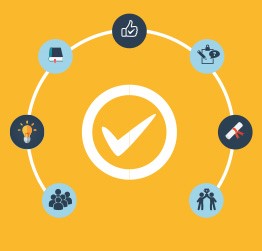The CLD Standards Council’s vision is that: ‘We will nurture a culture of learning in our sector in order that individual engagement will contribute to the development of the whole profession; we will celebrate learning, relish challenge, and reflect critically on our practice. Our vision for all CLD practitioners is that their participation in continuous professional development activities will be a central and established part of their practice. Through this they will demonstrate and enhance their commitment to a culture of learning.’
The publication of ‘Growing the learning culture in CLD: A Strategy Statement and a Framework for Action’ identified that the challenge for all of us is to work together to make sure that:
- Every employer (deployer) of CLD practitioners has in place a comprehensive professional development strategy and an action plan for implementation;
- Every CLD practitioners can articulate how professional development is embedded in their work.
The framework uses ‘the terms practitioner learning and practitioner development alongside and interchangeable with professional learning and professional development to emphasise that part-time, sessional and voluntary practitioners must be fully included in the commitments and actions set out.’
The CLDSC’s use of these terms rather than continuing professional development as previously, is in recognition that practitioners and, in particular CLD volunteers, ‘may undertake their learning and development in a practice setting or may participate in a formal learning programme after involvement, paid or unpaid, in CLD practice.’
Role of deploying organisation
As noted above the role of the deploying organisation is to have in place a comprehensive professional development strategy and an action plan for implementation which provides opportunities for CLD volunteers as well as their paid CLD workforce.
CLDSC is committed to providing resources and support to help you develop and implement your plan for both staff and volunteers.
The bulk of this support and a range of resources can be accessed through the idevelop website.
Professional Learning
We are at the early stages of mapping learning opportunities by region or area. These correspond to the CLD Regional Networks which cover most of Scotland. We also hope to include as much information as possible about PL opportunities in areas not yet covered by a Network. Links to information about opportunities available through Tayside and Fife Professional Learning Alliance and the West CLKD Alliance can be found on the homepage here on i-develop. The North Alliance has its own website which can be found at
http://www.orkneycommunities.co.uk/noRTHALLIANCE/
A draft matrix had been prepared for the West Regional Network but at the moment this only includes illustrative opportunities in adult learning and in youth work from Inverclyde. We would want the matrix to include opportunities targeting volunteers as well as those available to volunteers alongside paid staff and those that might be of interested in progressing towards degree level.
https://www.i-develop-cld.org.uk/pluginfile.php/7024/mod_page/content/17/WestYP.docx
https://www.i-develop-cld.org.uk/pluginfile.php/7024/mod_page/content/17/PLoppswestadult.docx
A number of training resources are available through idevelop as well as in Regions and localities. A directory bringing together resources particularly relevant to volunteers could be compiled via this theme. An example of such a resource is available below.
Inverclyde Literacies Training Resource

Pathway to degree qualifications
From volunteer, to part-time to fully-qualified is still a very common route for CLD practitioners. Discussions within the sector have highlighted a need to clarify/simplify/support a pathway from volunteer to degree level qualification. This another task we would to pursue through the discussion forum associated with this theme and through further research across the sector.
Standards Mark

For organisations who offer CLD learning to staff
The Standards Mark is the route offered for organisations who offer CLD learning to staff: from the smallest voluntary sector project to local authorities and national agencies. The Standards Mark process looks at the whole range of learning opportunities offered, not one specific programme, as well as the learning culture of the organisation.
The CLD Standards Council created the Standards Mark in response to feedback from a changing, growing and developing sector.
The Standards Mark:
· Provides national recognition of CLD learning opportunities for practitioners with strong focus on the values, principles, competences and Code of Ethics for CLD
· Celebrates success and promotes good practice and impact
· Establishes a developmental framework using peer moderation to enhance learning opportunities for CLD practitioners
The Standards Mark is designed to support employers to:
· Ensure that their organisation becomes a learning community for the entire workforce
· Develop and implement a CPD policy
· Provide continuous leadership and support for CPD opportunities
· Strengthen and extend local partnerships
· Encourage sharing of impact and learning from good practice
Our vision for all CLD practitioners is that their participation in continuous professional development activities will be a central and established part of their practice.
The Standards Mark will nurture a culture of learning in our sector in order that individual practitioner’s engagement with professional learning will contribute to the development of the whole profession. Through this they will demonstrate and enhance their commitment to a culture of learning:
· Where learning is celebrated, recognised and encouraged
· Where learning is reflected on and shared
· Where challenge is relished and embraced
· Where critical reflection is embedded in practice
· Where individuals can explore learning related to their role throughout their careers
This culture is underpinned by the values and competences of CLD and commitment to our Code of Ethics.
The Standards Mark does not replace the existing routes available for approval of individual learning programmes. For example, a provider may offer the PDA in Youth Work, approved using the Developmental process, and also be awarded the Standards Mark.
